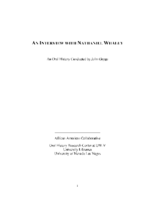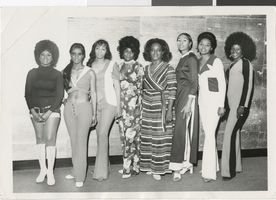Search the Special Collections and Archives Portal
Search Results
Lee Washington oral history interview
Identifier
Abstract
Oral history interview with Lee Washington conducted by Aleya Ford Wheaton on November 30, 2014 for the African Americans in Las Vegas: a Collaborative Oral History Project. In this interview, Washington discusses his personal history, moving to Las Vegas, Nevada in 1963, and his initial reactions to the city. He talks about his employment at the Tropicana Hotel and Casino as well as joining the Culinary Workers Union in 1974. Washington then describes church activity that he and his family were involved in at Most High Church and his church's significance to the West Las Vegas community. Lastly, he talks about the development and growth of businesses on the Westside.
Archival Collection
Stan Armstrong oral history interview
Identifier
Abstract
Oral history interview with Stan Armstrong conducted by Megan Laub on December 02, 2014 for the African Americans in Las Vegas: a Collaborative Oral History Project. In this interview, Armstrong discusses his childhood in West Las Vegas, Nevada and describes the neighborhood where he grew up. Armstrong recalls Westside businesses, nightlife, and entertainment that existed on Jackson Street. He then talks about his educational experiences, the racial segregation of schools at the time, and his employment at various stores on the Westside as a teenager. Later, Armstrong discusses the riots that erupted on the Westside in 1969 and shares how it affected the community. He goes on to recall riots that took place at Rancho High School while he was a student there. Lastly, Armstrong talks about his career as a filmmaker and professor at the University of Nevada, Las Vegas (UNLV).
Archival Collection

Transcript of interview with Nathaniel Whaley by John Grygo, March 6, 2013
Date
Archival Collection
Description
Interview with Nathaniel Whaley by John Grygo on March 6 and March 8, 2013. Whaley talks about growing up in Las Vegas and his adult life on the Westside. Nathaniel had a successful high school career as an accomplished athlete and Eagle Scout in the first black Boy Scout troop in the area. Nathaniel would go on to have a fruitful career as a mason and contractor, literally helping build the city of Las Vegas.
Text
D. D. Cotton oral history interview
Identifier
Abstract
Oral history interview with D. D. (Ethel Dolores) Cotton conducted by Claytee White on February 14, 1997 and March 21, 1997 for the Women's Research Institute of Nevada (WRIN) Las Vegas Women Oral History Project. In this interview, Cotton discusses the beginnings of her dance career in New York City, New York. Later in the interview, Cotton discusses working in Las Vegas, Nevada at the Cotton Club and her interactions with other African American entertainers. Cotton also discusses race relations and her experiences as an African American dancer in Las Vegas. Cotton later goes on to discuss her career change in the service industry.
Archival Collection
Ora Bland oral history interview
Identifier
Abstract
Oral history interview with Ora Bland conducted by Claytee D. White on March 04, 2021 for African Americans in Las Vegas: a Collaborative Oral History Project.
Ora Bland speaks to what she knew of her husband's secretive work at Area 51 of the Nevada Test Site, businesses in the Westside community, and her work in the downtown Las Vegas post office. In addition to her life experiences, Ora shares her thoughts on her community, the state of homelessness that many experience in her surrounding neighborhood, and her activities during the COVID-19 pandemic.
Archival Collection
Eugenia and Elijah Green oral history interview
Identifier
Abstract
Oral history interview with Eugenia and Elijah Green conducted by Claytee D. White on January 20, 2017 for the African Americans in Las Vegas: a Collaborative Oral History Project. In this interview, Elijah discusses his upbringing in Las Vegas, Nevada and growing up in the Westside. He recalls his father’s employment at the Basic Magnesium Plant, attending the Westside School, and the recreational activities he participated in as a young adult. Elijah talks about becoming a card dealer, his employment at the El Morocco Motel, and the businesses on Jackson Street. Eugenia describes moving to Las Vegas in 1975, her initial reaction to the city, and nightlife entertainment at the time. Later, Elijah talks about leaving work on the Westside to be a card dealer on the Strip. Lastly, Elijah and Eugenia discuss the future of Westside businesses.
Archival Collection

Transcripts of interview with Helen Anderson Toland, February 21, 2007
Date
Archival Collection
Description
Helen recalls coming to Las Vegas in the 1960s. She married early civil rights activist Jim Anderson in 1964. Helen was the first black female school principal in the Clark County School District.
Text
Sammie Armstrong oral history interview
Identifier
Abstract
Oral history interview with Sammie Armstrong conducted by Claytee D. White on March 08, 2017 for the African Americans in Las Vegas: a Collaborative Oral History Project. In this interview, Armstrong discusses his early life in Camden, Arkansas and growing up working on a farm. He recalls moving to Las Vegas, Nevada in 1963, and describes the Westside at that time. Armstrong talks about the businesses on Jackson Street, churches on the Westside, and integration in Las Vegas. Later, Armstrong discusses co-founding a transportation business in the early 1980s, Ray & Ross Transport, and providing transportation for Nevada Test Site employees. Lastly, Armstrong talks about growing his business into one of the largest bus companies in Nevada.
Archival Collection
Patricia Morse Jarman oral history interview
Identifier
Abstract
Oral history interview with Patricia Morse Jarman conducted by Claytee D. White on May 01, 2018 for the African Americans in Las Vegas: a Collaborative Oral History Project. In this interview, Jarman discusses her early life and joining the United States Air Force. She remembers moving to North Las Vegas, Nevada in 1974, being stationed at Nellis Air Force Base, and her decision to stay in Las Vegas after her military service. Jarman talks about her interest in sports analytics, becoming a boxing judge, and being appointed to the Nevada Consumer Affairs Commission. Lastly, Jarman discusses working with local government to prevent the development of apartment buildings on golf courses, and the 1 October shooting.
Archival Collection

Photograph of a group at an NAACP event including Eleanor Walker, no date
Date
Archival Collection
Description
Black and white photograph of a group of women, including former NAACP President Eleanor Walker (third from left).
Image
